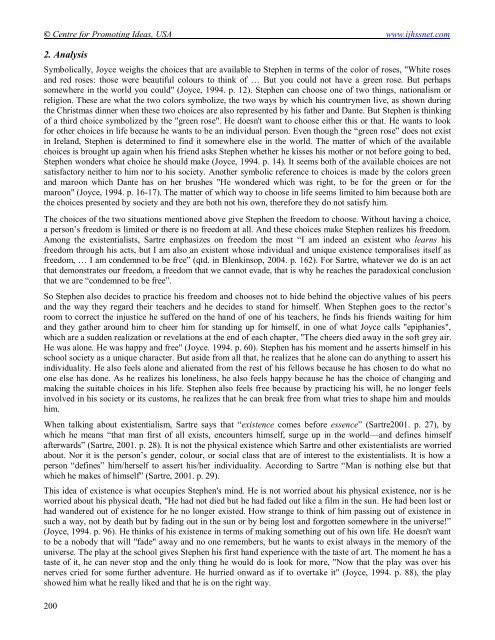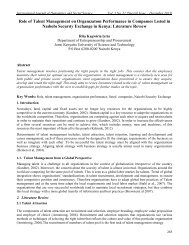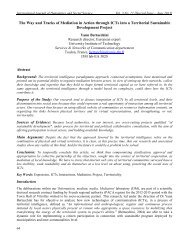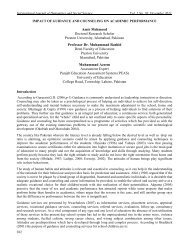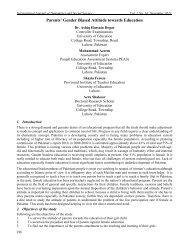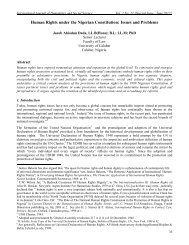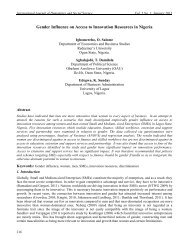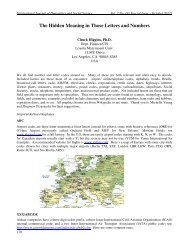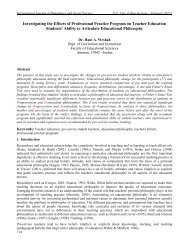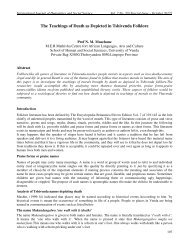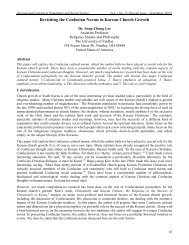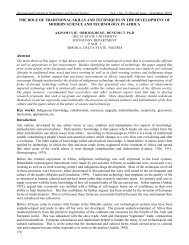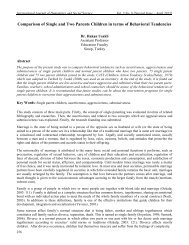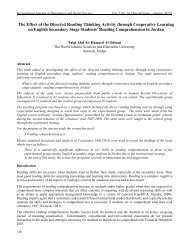The Portrait of Stephen as an Existentialist - International Journal of ...
The Portrait of Stephen as an Existentialist - International Journal of ...
The Portrait of Stephen as an Existentialist - International Journal of ...
You also want an ePaper? Increase the reach of your titles
YUMPU automatically turns print PDFs into web optimized ePapers that Google loves.
© Centre for Promoting Ide<strong>as</strong>, USA www.ijhssnet.com<br />
2. Analysis<br />
Symbolically, Joyce weighs the choices that are available to <strong>Stephen</strong> in terms <strong>of</strong> the color <strong>of</strong> roses, "White roses<br />
<strong>an</strong>d red roses: those were beautiful colours to think <strong>of</strong> … But you could not have a green rose. But perhaps<br />
somewhere in the world you could" (Joyce, 1994. p. 12). <strong>Stephen</strong> c<strong>an</strong> choose one <strong>of</strong> two things, nationalism or<br />
religion. <strong>The</strong>se are what the two colors symbolize, the two ways by which his countrymen live, <strong>as</strong> shown during<br />
the Christm<strong>as</strong> dinner when these two choices are also represented by his father <strong>an</strong>d D<strong>an</strong>te. But <strong>Stephen</strong> is thinking<br />
<strong>of</strong> a third choice symbolized by the "green rose". He doesn't w<strong>an</strong>t to choose either this or that. He w<strong>an</strong>ts to look<br />
for other choices in life because he w<strong>an</strong>ts to be <strong>an</strong> individual person. Even though the “green rose” does not exist<br />
in Irel<strong>an</strong>d, <strong>Stephen</strong> is determined to find it somewhere else in the world. <strong>The</strong> matter <strong>of</strong> which <strong>of</strong> the available<br />
choices is brought up again when his friend <strong>as</strong>ks <strong>Stephen</strong> whether he kisses his mother or not before going to bed,<br />
<strong>Stephen</strong> wonders what choice he should make (Joyce, 1994. p. 14). It seems both <strong>of</strong> the available choices are not<br />
satisfactory neither to him nor to his society. Another symbolic reference to choices is made by the colors green<br />
<strong>an</strong>d maroon which D<strong>an</strong>te h<strong>as</strong> on her brushes "He wondered which w<strong>as</strong> right, to be for the green or for the<br />
maroon" (Joyce, 1994. p. 16-17). <strong>The</strong> matter <strong>of</strong> which way to choose in life seems limited to him because both are<br />
the choices presented by society <strong>an</strong>d they are both not his own, therefore they do not satisfy him.<br />
<strong>The</strong> choices <strong>of</strong> the two situations mentioned above give <strong>Stephen</strong> the freedom to choose. Without having a choice,<br />
a person‟s freedom is limited or there is no freedom at all. And these choices make <strong>Stephen</strong> realizes his freedom.<br />
Among the existentialists, Sartre emph<strong>as</strong>izes on freedom the most “I am indeed <strong>an</strong> existent who learns his<br />
freedom through his acts, but I am also <strong>an</strong> existent whose individual <strong>an</strong>d unique existence temporalises itself <strong>as</strong><br />
freedom, … I am condemned to be free” (qtd. in Blenkinsop, 2004. p. 162). For Sartre, whatever we do is <strong>an</strong> act<br />
that demonstrates our freedom, a freedom that we c<strong>an</strong>not evade, that is why he reaches the paradoxical conclusion<br />
that we are “condemned to be free”.<br />
So <strong>Stephen</strong> also decides to practice his freedom <strong>an</strong>d chooses not to hide behind the objective values <strong>of</strong> his peers<br />
<strong>an</strong>d the way they regard their teachers <strong>an</strong>d he decides to st<strong>an</strong>d for himself. When <strong>Stephen</strong> goes to the rector‟s<br />
room to correct the injustice he suffered on the h<strong>an</strong>d <strong>of</strong> one <strong>of</strong> his teachers, he finds his friends waiting for him<br />
<strong>an</strong>d they gather around him to cheer him for st<strong>an</strong>ding up for himself, in one <strong>of</strong> what Joyce calls "epiph<strong>an</strong>ies",<br />
which are a sudden realization or revelations at the end <strong>of</strong> each chapter, "<strong>The</strong> cheers died away in the s<strong>of</strong>t grey air.<br />
He w<strong>as</strong> alone. He w<strong>as</strong> happy <strong>an</strong>d free" (Joyce. 1994. p. 60). <strong>Stephen</strong> h<strong>as</strong> his moment <strong>an</strong>d he <strong>as</strong>serts himself in his<br />
school society <strong>as</strong> a unique character. But <strong>as</strong>ide from all that, he realizes that he alone c<strong>an</strong> do <strong>an</strong>ything to <strong>as</strong>sert his<br />
individuality. He also feels alone <strong>an</strong>d alienated from the rest <strong>of</strong> his fellows because he h<strong>as</strong> chosen to do what no<br />
one else h<strong>as</strong> done. As he realizes his loneliness, he also feels happy because he h<strong>as</strong> the choice <strong>of</strong> ch<strong>an</strong>ging <strong>an</strong>d<br />
making the suitable choices in his life. <strong>Stephen</strong> also feels free because by practicing his will, he no longer feels<br />
involved in his society or its customs, he realizes that he c<strong>an</strong> break free from what tries to shape him <strong>an</strong>d moulds<br />
him.<br />
When talking about existentialism, Sartre says that “existence comes before essence” (Sartre2001. p. 27), by<br />
which he me<strong>an</strong>s “that m<strong>an</strong> first <strong>of</strong> all exists, encounters himself, surge up in the world—<strong>an</strong>d defines himself<br />
afterwards” (Sartre, 2001. p. 28). It is not the physical existence which Sartre <strong>an</strong>d other existentialists are worried<br />
about. Nor it is the person‟s gender, colour, or social cl<strong>as</strong>s that are <strong>of</strong> interest to the existentialists. It is how a<br />
person “defines” him/herself to <strong>as</strong>sert his/her individuality. According to Sartre “M<strong>an</strong> is nothing else but that<br />
which he makes <strong>of</strong> himself” (Sartre, 2001. p. 29).<br />
This idea <strong>of</strong> existence is what occupies <strong>Stephen</strong>'s mind. He is not worried about his physical existence, nor is he<br />
worried about his physical death, "He had not died but he had faded out like a film in the sun. He had been lost or<br />
had w<strong>an</strong>dered out <strong>of</strong> existence for he no longer existed. How str<strong>an</strong>ge to think <strong>of</strong> him p<strong>as</strong>sing out <strong>of</strong> existence in<br />
such a way, not by death but by fading out in the sun or by being lost <strong>an</strong>d forgotten somewhere in the universe!”<br />
(Joyce, 1994. p. 96). He thinks <strong>of</strong> his existence in terms <strong>of</strong> making something out <strong>of</strong> his own life. He doesn't w<strong>an</strong>t<br />
to be a nobody that will "fade" away <strong>an</strong>d no one remembers, but he w<strong>an</strong>ts to exist always in the memory <strong>of</strong> the<br />
universe. <strong>The</strong> play at the school gives <strong>Stephen</strong> his first h<strong>an</strong>d experience with the t<strong>as</strong>te <strong>of</strong> art. <strong>The</strong> moment he h<strong>as</strong> a<br />
t<strong>as</strong>te <strong>of</strong> it, he c<strong>an</strong> never stop <strong>an</strong>d the only thing he would do is look for more, "Now that the play w<strong>as</strong> over his<br />
nerves cried for some further adventure. He hurried onward <strong>as</strong> if to overtake it" (Joyce, 1994. p. 88), the play<br />
showed him what he really liked <strong>an</strong>d that he is on the right way.<br />
200


